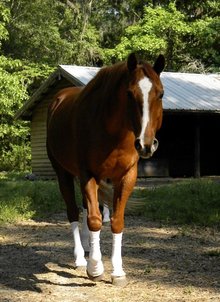It is one of the worst equine autoimmune diseases of our time and by the time Sam M. of the United Kingdom reached halfway across the world for help from Tallahassee, Florida-based Sox For Horses ® Inc., Leukocytoclastic Vasculitis and its underlying photosensitivity had made his gelding's life miserable.

Sox for horses for equine autoimmune diseases
Sox are the best drug-free, preventative option for horses that suffer from photosensitive conditions affecting their legs. Vets and owners need to be more aware of how great Sox are.
© 2015 by Sox for Horses
âMy horse was diagnosed with Leukocytoclastic Vasculitis, an immune disorder affecting both hind legs where he has pink skin. The condition is activated by external sources (UV/UB light, fly bites... no one knows for certain).
When his pink skin is exposed it causes horrendous swelling, followed by dermatitis where his veins (blown out by an over-active immune system) have been destroyed,â Sam told SFH president, Raymond Petterson.
As recently as November 2013, in the Abstract of 'Equine pastern vasculitis: a clinical and histopathological study,' published November 2013 by Psalla, Rüfenacht, Stoffel, Chiers, Gaschen, Doherr, Gerber and Welle in the Veterinary Journal, a study and biopsies on 20 horses cited that no underlying cause of equine vasculitis could be identified: âIt was concluded that intramural inflammatory cells, leukocytoclasia with nuclear dust, thickening and edema of vessel walls, and micro-hemorrhages are highly specific histological findings in equine vasculitis.
Lesions were mostly seen on lateral and medial aspects of unpigmented legs. Lesions in white skin were characterized by exudation and crusts, whereas those in pigmented skin were alopecic and characterized by scaling. Response to treatment was poor and prognosis guarded. Causative agents are difficult to identify but may involve hypersensitivity to antigens.â
In other words, it's a painfully sensitive way to live. But thanks to SFH, Sam says his horse is protected and no longer suffering from LV's photosensitive effects: âMy horse has been LV-free since he began wearing your Sox in 2015.
With the exception of one cloudy week when, regretfully, I thought he would be okay without wearing his Sox because of the lack of sunshine. I was wrong. The condition re-activated and he was back on steroids for two months. (Expensive) lesson learned!"
Sam continued, âSox are the best drug-free, preventative option for horses that suffer from photosensitive conditions affecting their legs. Vets and owners need to be more aware of how great Sox are. We shouldn't just be talking about Sox as protection against UV light and flies, we should be shouting about it!â
